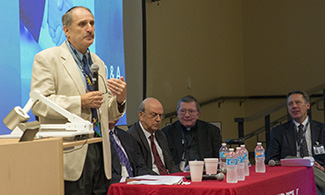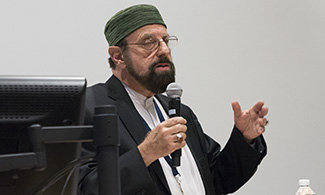Monday, October 12, 2015
Mon, 12 Oct 2015 | Shelley Andrews | LUCOM Marketing and PR
At the core of the osteopathic medical philosophy is the holistic belief that it is the treatment of the patient that should be at the center of the physician’s approach to care rather than an emphasis on the treatment of the disease. To support that philosophy, student-doctors at Liberty University College of Osteopathic Medicine (LUCOM) heard directly from a diverse panel of local religious leaders about how to be sensitive to the inclusion of the diverse faiths of our population into their future patients’ care.
Four area religious leaders spoke at a LUCOM presentation October 7: Dave McGrath, Hospital Liaison Committee for the Jehovah Witness; Shaykh Ahmed Abdur Rashid, World Community; Rabbi John Nimon, Agudath Sholom Synagogue; and Monsignor Ken Rush, Holy Cross Catholic Church. Randal Walton, Centra Health’s Director of Pastoral Care, moderated the discussion. Roberta Wattleworth, D.O., associate dean of medical education and director of LUCOM’s Humanities and Medical Jurisprudence course, organized the presentation.
“There are many aspects of religion that intersect with medicine. The more prepared students are, the less issues will catch them off guard and the more benefit they will give patients and families when they need it most,” said Dr. Wattleworth.

McGrath kicked off the presentation with an overview of what Jehovah’s Witnesses believe in regards to health care and wanted to clear a misconception that followers are “anti-medicine.”
“We seek quality medical care. That’s why we go to the hospital in the first place,” said McGrath.
He went on to explain the challenges doctors face in dealing with this segment of the population. Jehovah’s Witnesses refuse blood transfusions, citing Bible-based reasons. But McGrath encouraged student-doctors to think outside of the box.
“There are tried and tested medical alternatives to transfusions that Jehovah’s Witnesses do accept. Medications and surgery procedures that have been around for decades,” said McGrath.
Rabbi Nimon spoke on behalf of the Jewish faith and explained why they are very careful about the medical decisions made in a person’s final days.
“With respect to birth, we believe all people are created in the image of God. And because of that, all human life is of infinite worth. We can’t do anything to shorten life. Anything actively,” Rabbi Nimon said.
 He also explained something doctors and other hospital staff will encounter when a Jewish patient passes away: Jews bury their loved ones quickly, between 24 to 48 hours after they die. Rabbi Nimon left the student-doctors with an encouraging message about how they won’t always know what to do: “You have an awesome responsibility. Try to do your best to live up to it. If you don’t, at times, forgive yourself.”
He also explained something doctors and other hospital staff will encounter when a Jewish patient passes away: Jews bury their loved ones quickly, between 24 to 48 hours after they die. Rabbi Nimon left the student-doctors with an encouraging message about how they won’t always know what to do: “You have an awesome responsibility. Try to do your best to live up to it. If you don’t, at times, forgive yourself.”
Shaykh Ahmed Abdur Rashid came to LUCOM from World Community, a Muslim community in Bedford.
“No one expects you to know all the rites and all the rituals, but what is expected is you would inquire and support what the patient needs and believes and is comfortable with,” said Rashid.
He told student-doctors to be aware of dietary restrictions and privacy when treating Muslim patients. If there is no other option but a male doctor to see a female patient, he recommends bringing in a female nurse to ease tension. Rashid also mirrored some of the issues Jewish families face when a loved one dies in a medical institution.
“It’s very important that you understand that there needs to be time when a person is deceased that they are given in the hospital to spend with their beloved. It’s very important that you understand that the nursing staff and the supportive staff are also trained for that compassion,” said Rashid.
Monsignor Ken Rush from Holy Cross Catholic Church was the last leader to speak.
“You are about the business of healing and curing, but what happens when you can’t? I think physicians have gotten better at that, with the hospice movement and other things, to allow a patient to go to God,” said Monsignor Rush.
Monsignor Rush briefly discussed what he described as a “curious” part of the Catholic faith: when patients and their families request a priest to come to administer “The Last Rites,” also known as “The Sacrament of the Sick.” This can happen with a patient is dying, when they are sick or before they undergo a surgery.
He remembers an insensitive comment he received when he was called to visit a hospital years ago.
“The nurse, I still remember what she said to me. She said ‘well, whatever you all do.’ I still remember that. I think that’s the one word you should leave with today… that’s sensitivity. Sensitivity for your patients and their faith and maybe even their lack of faith,” said Monsignor Rush.
“We all need to see things from others’ viewpoint, and remember that the patient is the heart of why we are in this profession,” concluded Dr. Wattleworth.